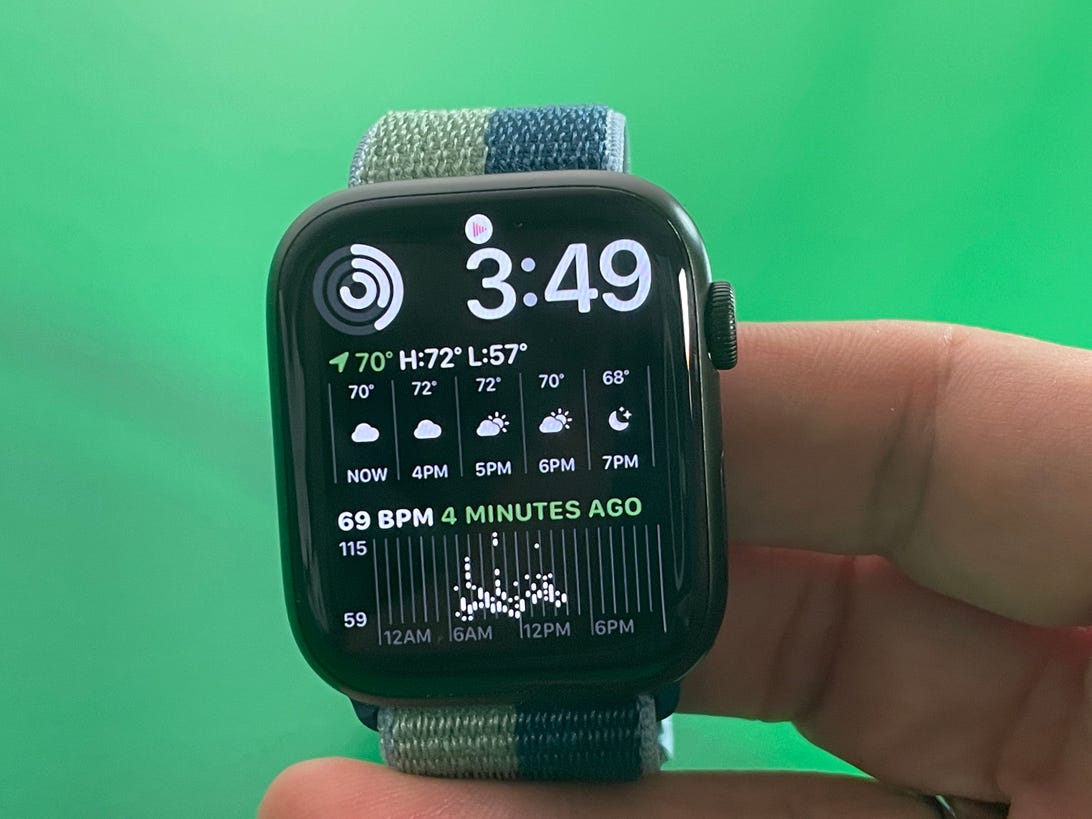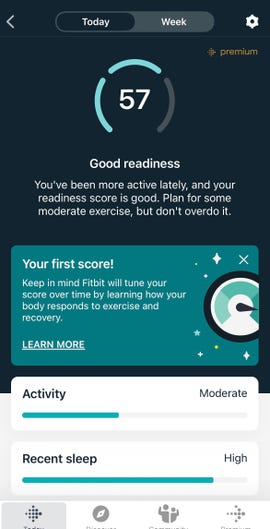
The Apple Watch's Activity Rings help with fitness tracking, but they don't let you know when to take it easy.
Scott Stein/CNETMy Apple Watch knows how many calories I burned yesterday, whether my heart is beating at a normal rhythm and how many hours of sleep I got last night. It can't, however, make sense of the numbers it gathers by telling me whether I should hit the gym or take a rest day.
Smartwatches and fitness bands have been capable of tracking activity, heart rate and sleep data for years. But only recently has there been a bigger focus on using that information to make broader observations about our well-being.
Fitbit launched its readiness score for Premium subscribers last month, a metric that indicates whether you should prioritize recovery or exercise. More specialized devices like the Oura ring and Whoop band have been offering similar scores for years and are considered pioneers in this area.
I recently wore an Oura ring over the course of a week and briefly tried Fitbit's readiness score when it launched in November. The Apple Watch is still my go-to fitness tracker, but I've enjoyed wearing an Oura ring alongside it -- mostly because of the readiness score. Apple Watch wearers can get a similar rating through the third-party sleep tracking app AutoSleep, but Apple doesn't have its own answer to this yet.

The Oura ring's readiness score helps let you know when you should workout a bit harder, or easier.
Scott Stein/CNETWhy the readiness score is so useful
I've become obsessed with closing my Apple Watch's Activity Rings, especially since I started working from home during the pandemic. If I don't close at least two rings (but ideally all three), my day feels incomplete. That encouragement has been especially helpful now that I'm not regularly starting my day with a brisk 10-minute walk to the subway.
But this fixation on my rings also means I often push myself to exercise when I probably shouldn't. That includes times when I didn't get a good night's sleep, as well as days when I'm still very sore from the prior day's workout.
Oura's readiness score has been very helpful in this regard. When I'm wearing the Oura ring, my readiness score is one of the first things I check when reaching for my phone each morning. And more often than not, Oura's assessment lines up with how I'm feeling.
For example, my readiness score was on the low side over the weekend when I was up until around 3 a.m. hosting a few friends. But it was optimal throughout the week when I had a consistent bedtime and wasn't consuming alcohol.
The Oura app's home screen offers bits of advice alongside these scores to help you make sense of them. A score of 60, for example, was accompanied by a warning to pay attention to how I'm feeling and take it easy today. Oura also lowered my activity goal to below average on a day when I received a readiness score of 65 to motivate me to prioritize rest. Fitbit's equivalent feature similarly adjusts goals and suggests specific workouts or programs based on your score.
I know what you're probably thinking. You don't need a $300 ring to tell you that you're more tired after a late night of partying with friends; that's just common sense. Still, having that context factored into your goals is more helpful than you might think. I don't feel guilty about trading my HIIT workout for a brisk walk when my fitness app is telling me to slow things down. Not to mention, it also provides extra motivation to get to bed early.

Fitbit's readiness score gives actionable advice for when you shouldn't overdo your workout.
Screenshot by Lexy Savvides/CNETThere are slight variations in how these scores are calculated between Oura and Fitbit, but the general idea is the same. Oura's readiness score is based on activity, sleeping patterns, resting heart rate, body temperature and heart rate variability. A score of 85 or higher is considered optimal, while a rating of between 70 and 84 is good. Scoring under 70 means you're not fully recovered.
Fitbit's scale is a little different. A score of 30 or higher means you're ready for a workout, while 29 or lower indicates you should prioritize rest and recovery. Fitbit collates data around sleep, activity and resting heart rate variability to calculate this score.
The Apple Watch's shortcomings
The Apple Watch can encourage you to move, applaud you after a particularly active day, remind you to take a few moments to relax and nudge you to get to bed on time. But these notifications don't feel as personal or actionable as a readiness score.
It feels like these reminders are mostly based on my activity trends, while Fitbit and Oura are combining that with bodily signals to come up with tips that feel more individualized. Aside from the general usefulness of having more targeted goals, rest days are a critical part of any health exercise regimen.They allow your body to recover and can be critical in preventing injury.
Apple already knows the importance of listening to your body and making sure you're not pushing yourself too hard. There's evidence of this in the Apple Watch's latest software update and Apple Fitness Plus.
Classes in Apple's fitness program, for example, include modification options for those who might need a more mild workout. Apple also expanded the Apple Watch's meditation tools in WatchOS 8 by launching the new Mindfulness app. It also offers Mindful Cooldowns after workouts for those who need to spend extra time stretching and meditation to lower their heart rate.
It's great that Apple offers these options. But companies like Oura, Fitbit and Whoop have proven that there's a lot more Apple could be doing in this space. My theory is that part of the reason why Apple doesn't have its own version of a readiness score is because the Apple Watch doesn't track as much sleep data natively as other fitness trackers.
The Apple Watch monitors sleep duration, but doesn't measure time spent in various stages of sleep like its competitors. Since sleep is a factor in Oura and Fitbit's respective readiness scores, there's a chance that could be part of the answer. But this is just speculation of course. Only Apple knows the answer for certain.
The bottom line is that health metrics are only useful when accompanied by context that can help you understand what to make of those numbers. The readiness score is the most promising way fitness trackers are putting that into practice today, and I'm hopeful that Apple will soon do so too.
Technology - Latest - Google News
December 20, 2021 at 08:00PM
https://ift.tt/3EkOcje
Apple Watch needs to steal this feature from Oura and Fitbit - CNET
Technology - Latest - Google News
https://ift.tt/2AaD5dD
Bagikan Berita Ini














0 Response to "Apple Watch needs to steal this feature from Oura and Fitbit - CNET"
Post a Comment